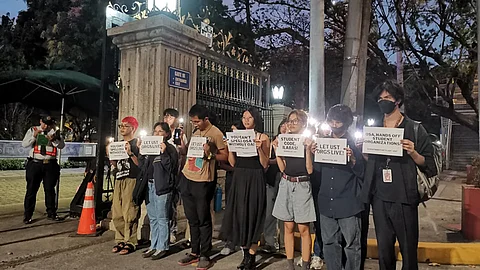

STUDENT journalists and advocacy groups across the Philippines continued their protests against the University of Santo Tomas (UST), one of the oldest and largest Catholic universities in Asia, after it allegedly ordered its campus online media organization, TomasinoWeb, to delete a photo of their students in uniform entering a known convenience store.
As of Tuesday, February 27, 2024, over 900 signatories have been registered from the UST Alumni groups who have created a website to support TomasinoWeb called https://standwithtomasinoweb.com/.
They criticized the Office for Student Affairs (OSA) and called for the removal of all personalities associated with the incident.
“Let us call a spade a spade. The University of Santo Tomas through its Office for Student Affairs clearly censored TomasinoWeb over a benign photo of students. Its order to take down the image and its threat to dissolve the organization is definitely an encroachment on the constitutionally-enshrined rights of students,” the UST Alumni said.
“We, Thomasian alumni, believe that the gagging of the campus press through OSA is just a symptom of a much more malignant disease in UST, one that has plagued the university since its establishment under colonial rule. The UST administration’s transgressions against TomasinoWeb is definitely not isolated, but part of a systemic problem of campus repression which they have refused to address and instead have allowed to fester,” it added.
In a statement posted on the new website created by UST Alumni to support the beleaguered student media outfit, they maintained that “it is clear that what brought UST public ridicule is not TomasinoWeb’s photo, but the university itself and its refusal to uphold and recognize students’ rights.”
“This must end now,” the group added.
According to the TomasinoWeb, the issue started when some members of the university administration “raised concerns” regarding a photograph they posted on February 15, showing some College of Information and Computing Science (CICS) students in their Type B uniforms in front of the 7-Eleven branch at the UST Quadricentennial Pavilion.
“The organization was told that the photo has become a source of public ridicule toward CICS students, their College, and the University as a whole due to the supposed association of the CICS Type B uniform with the convenience store’s employee uniforms,” the student website said in a statement.
“TomasinoWeb never intended to cause any harm to anyone. While we believe being a convenience store worker is honest work, we acknowledge that the photograph still caused a stir online, and for that we sincerely apologize,” it added.
To rectify this, TomasinoWeb removed the said controversial photograph from the album across all its social media platforms.
On February 18, publication staff posted another advisory, saying: “In view of the resignation of our organization adviser, and following the protocol of the Office for Student Affairs, our publication on all social media platforms will be on hold until further notice.”
Speaking to various media outlets shortly after the incident, former TomasinoWeb adviser Leo Laparan II maintained that what happened “was censorship.”
“And I cannot accept and I cannot believe that as a practicing journalist, this incident happened in my two-decade career in a media organization in a student environment setting,” said Laparan II, who also worked as a desk editor for a national broadsheet, Philippine Star.
Meanwhile, the National Union of Journalists of the Philippines (NUJP) called on UST to “stop censoring the campus press.”
“Any imposed takedown, especially over an imagined slight and not because of a factual or ethical lapse, erodes press freedom and the independence of the press,” it said.
“The UST administration's reaction to a harmless photograph on TomasinoWeb of CICS students wearing their Type B uniform in front of a convenience store exposes its elitist stance. The Catholic school should instead uphold the dignity of work and honor the workers' contributions to the Philippine society,” added NUJP in a statement on February 19.
At least seven UST college-based student publications also issued a joint statement on February 20 in support of TomasinoWeb, saying that “instead of fostering constructive dialogue about the challenges faced by convenience store workers, this situation has unfortunately led to unwarranted censorship, creating a chilling effect on other avenues of publication.”
The UST administration and the OSA have yet to issue an official statement on the controversy.
As this developed, other student publication groups have expressed solidarity with TomasinoWeb.
“Censorship, even at the campus level, is a form of oppression that suppresses free speech. Press freedom is not a privilege, but a fundamental right that serves as the bedrock of a democratic society,” said An Lantawan, a student publication of Leyte Normal University in Tacloban City.
“Hence, we, at An Lantawan, refuse to remain silent against such repressive acts against the campus press, especially that we have experienced firsthand the challenges and threats that come with our commitment to truth and transparency,” added An Lantawan.
In a statement on February 26, the Tacloban City-based campus publication urged for the “swift enactment of House Bill 1155 or the Campus Press Freedom Bill.”
“This bill aims to revoke the Campus Journalism Act of 1991, which has several defects that endanger campus press freedom, such as the lack of guarantees for editorial autonomy. It also addresses the sources of campus press freedom violations and grants vital protections for student journalists,” it added.
The College Editors Guild of the Philippines, the broadest alliance of tertiary student publications in the Asia-Pacific, reported around 1,000 cases of campus press violations from 2010 to 2020.
Most of the offenses include harassment, libel cases against campus publication staff, and administrative intrusion. (Ronald O. Reyes/SunStar Philippines)